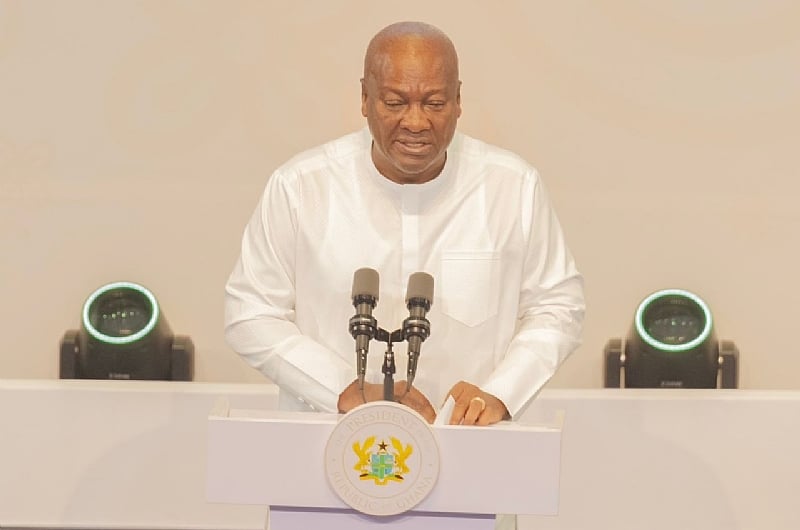In a decisive address to Parliament, President John Mahama outlined a comprehensive strategy to restore stability in Ghana’s energy sector while accelerating the nation’s transition to renewable energy. His vision focuses on economic efficiency, environmental sustainability, and climate resilience, positioning Ghana as a leader in Africa’s green energy revolution.
Energy Sector Reforms: Restoring Stability and Efficiency
Acknowledging the current challenges in Ghana’s energy sector, President Mahama reaffirmed his commitment to restoring stability through strategic reforms. He directed the Minister for Energy and Green Transitions to implement transformative measures, including:
Enforcing a single revenue collection account to enhance financial transparency. Strict adherence to the Cash Waterfall Mechanism (CWM) for efficient fund allocation. Eliminating wasteful expenditures to improve economic efficiency.
A notable success story is the pilot partnership between the Electricity Company of Ghana (ECG) and Enclave Power Limited. Under this initiative, ECG supplies bulk power to Enclave Power, which then provides meters and bills companies within the Free Zones Enclave. This model has achieved 99% revenue collection and nearly 100% power supply uptime, showcasing the potential of public-private partnerships in power distribution.
“This partnership serves as a blueprint for reducing commercial and technical losses, ultimately leading to affordable tariffs and greater relief for all users of electric power,” President Mahama emphasized.
Transitioning to Cleaner Energy Sources
Natural Gas and Renewable Energy Initiatives
To enhance energy security and reduce operational costs, President Mahama outlined a medium-term goal of achieving 100% gas utilization for power production. This strategic shift aims to eliminate the use of crude oil, saving Ghana hundreds of millions of dollars in fuel import costs while reducing carbon emissions.
In a bold move to accelerate Ghana’s green transition, President Mahama announced the launch of a Renewable Energy and Green Transition Fund. The fund is designed to drive investments in sustainable energy solutions, including:
Solar street lighting and rooftop solar installations to reduce dependence on the national grid. Off-grid solar systems for remote areas, ensuring energy access for all. Infrastructure for electric vehicle charging stations and chargeable outboard motors, promoting e-mobility.
“These initiatives not only enhance energy diversification and security but also position Ghana as a leader in Africa’s renewable energy transition,” he stated.
Challenges in the Petroleum Sector
A Declining Industry and Economic Implications
Despite Ghana’s renewable energy ambitions, President Mahama acknowledged the stark challenges in the petroleum sector. He revealed that crude oil production has declined by over 32% due to high opacity, political interference, and an unfavorable business environment. This has led to the exit of major oil companies and a stagnation of upstream activities.
“This decline poses significant economic risks due to reduced petroleum export revenues,” he warned, emphasizing the urgent need to diversify energy sources through renewables.
Tackling Climate Change and Environmental Challenges
Coastal Erosion and Urban Flooding
With Ghana’s coastline spanning approximately 550 kilometers, President Mahama highlighted the growing threat of tidal wave erosion, impacting nearly 30% of the population. Rising sea levels have worsened coastal vulnerabilities, leading to wetland flooding, habitat loss, and community displacement.
Urban centers are also increasingly prone to flooding due to inadequate drainage systems, poor urban planning, and encroachment on wetlands and floodplains. President Mahama emphasized that coastal protection and sustainable urban drainage solutions have become national priorities.
To address these challenges, his administration plans to explore alternative funding sources to support essential drainage, desilting, flood control, and coastal protection initiatives.
“Our approach emphasizes disaster risk reduction and climate adaptation, crucial for protecting vulnerable communities and minimizing economic losses linked to climate-induced disasters,” he stated.
Climate Mitigation and International Commitments
Aligning with Global Climate Goals
President Mahama underscored Ghana’s commitment to global climate action by revealing that the nation has allocated 24 million metric tonnes of its carbon budget under Article 6 of the Paris Agreement. Three authorized projects are expected to reduce 5.2 million tonnes of carbon emissions.He also reiterated Ghana’s commitment to:
Limiting global warming to 1.5°C by 2050. Promoting a fair and just transition to renewable energy sources. Strengthening institutional and human capacity for climate resilience in critical sectors such as agriculture, forestry, energy, and water resources.
“These commitments not only enhance Ghana’s leadership in climate diplomacy but also open avenues for international climate finance and technological support,” he added.
A Strategic Vision for a Sustainable Future
President Mahama’s bold strategy integrates energy stability, economic efficiency, and climate resilience. By prioritizing renewable energy and natural gas, his administration aims to:
Reduce dependency on fossil fuels. Lower carbon emissions. Enhance energy security.
Through proactive coastal protection and urban drainage solutions, Ghana seeks to build resilient communities and safeguard livelihoods against climate impacts.
With his vision for a Renewable Energy and Green Transition Fund, President Mahama is setting Ghana on a path to sustainable development while positioning the country as a leader in Africa’s green energy transition.
“As a nation, we must be resolute in our commitment to restoring stability while leading the charge in Africa’s renewable energy revolution,” he concluded.
This strategic roadmap not only promises long-term socio-economic and environmental benefits but also showcases Ghana’s role as a proactive leader in the global fight against climate change.
Emmanuel Gameli Dovia
Broadcast Journalsit/ Executive Director, ICCEP-GHANA
0242023440


